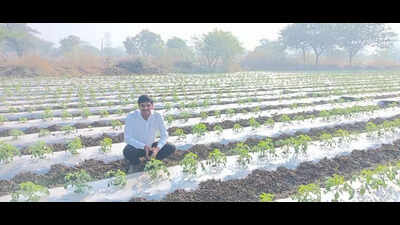Trending
Govt apathy, legal gaps lead to exploitation
Nashik: When the tomato plants he had grown on two acres failed to bloom in 2010, wiping out his investment of Rs 1lakh, Praveen Gavhane (then aged 20) from Kanchangaon in Igatpuri taluka had the first inkling that this devastating loss had something to do with substandard seeds.
Unlike many who would quietly accept misfortune, he rallied nearly 200 such farmers from the taluka to approach the district consumer disputes redressal commission, Nashik, in an attempt to hold the company to account.
"However, after several rounds of discussions, only 20 filed applications. Four were admitted," Gavhane says, adding the seed inspector collected samples from him and got them tested in the district laboratory.
The lab report confirmed their suspicion, and the district forum ruled in their favour. However, the company appealed before the state and national commission, stretching the legal battle for 12 years.
Though his fight against corporate malpractice set an example, he points out, farmers continue to face deception by companies that exploit legal loopholes and refuse to take responsibility.
While marketing their products these firms offer attractive prices and promise bumper yield, says Ashok Jadhav from Baglan who lost his crop of maize in 2019. He too knocked on the district commission's door, which ruled in his favour and fixed the compensation. The seed company challenged the order before the state panel. But Jadhav, who lacked the required resources and time, abandoned his pursuit.
Five years later, he says that if seed inspectors were doing their job he would not be in this situation. Dnyandeo Jadhav from Khatwad in Dindori taluka says two "part-time" inspectors are not enough to cover the entire taluka.
On Sept 18, 2024, he filed a complaint with the panchayat samiti, blaming faulty seeds for the tomato crop failure. However, the seed inspector visited his farm on Oct 10. "Till then I had to keep watering the plants to ensure they did not die," he says.
The division-level seed quality inspector, Ulhas Thakur, rules out any shortage but admits two agriculture officers in each taluka double up as seed inspectors.
"One of these officers visits the field with a team — including a representative of the company and a scientist from the agriculture university in the area — and gets the samples tested. A report is made available to farmers free of cost," Thakur says, adding the officer can file criminal cases against companies.
Jadhav says the duty of an inspector and govt laboratory is limited to checking only germination. "They fail to look into the morphological and genetical characters — that deal with the length, colour, taste and shape of crop."
Financially robust companies hire hotshot lawyers to exhaust farmers' resolve, a lawyer says, highlighting the need for govt intervention. "The seed inspector has the right to file a complaint on behalf of farmers. And the commission can by a single order direct companies to pay compensation. But none of these happens."
Suresh Patil, vice president of Nashik's Grahak Panchayat, advocates for a separate court to hear farmers' grievances. "If we have a cooperative court, a labour court or an industrial court, why cannot we have a court for agriculture?"
End of Article
FOLLOW US ON SOCIAL MEDIA










